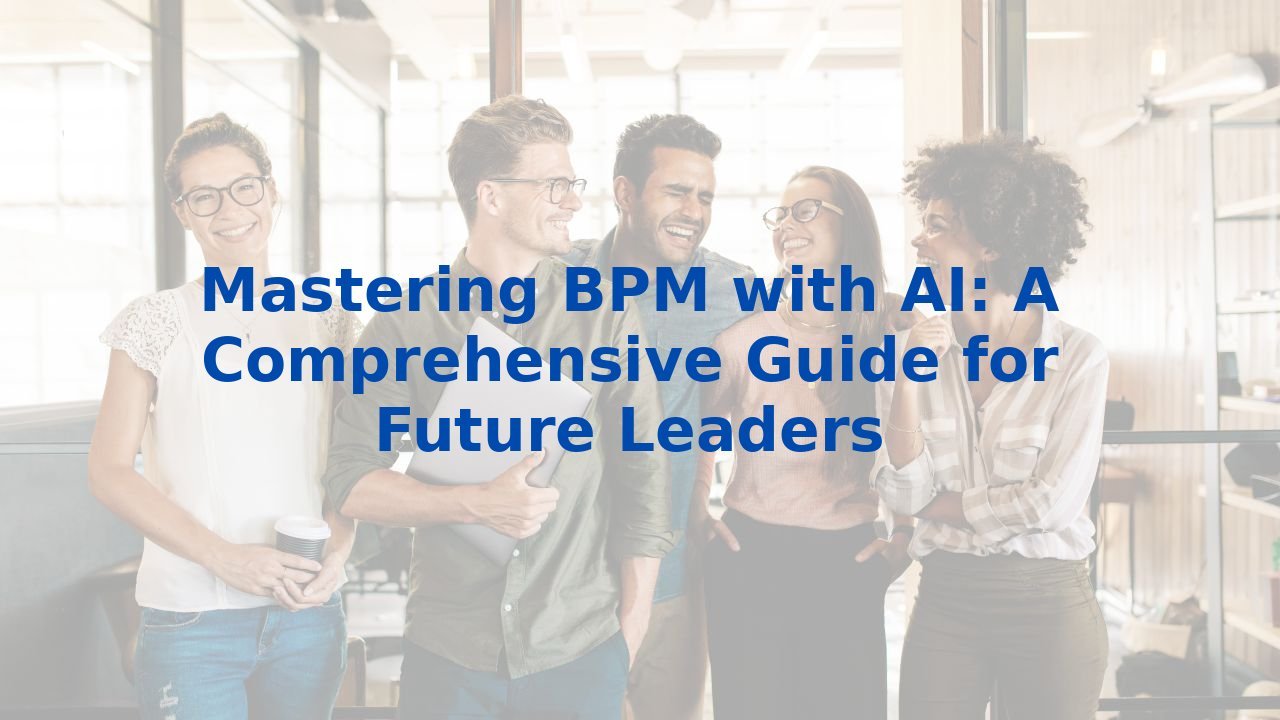Mastering BPM with AI: A Comprehensive Guide for Future Leaders
Mastering BPM with AI: A Comprehensive Guide for Future Leaders
Introduction
In the relentless pace of today's business world, mastering business process management (BPM) is not just a strategy; it's an imperative. The introduction of artificial intelligence (AI) has fundamentally reshaped BPM, providing companies with the means to streamline operations, enhance decision-making, and considerably boost customer satisfaction. This guide will explore the essence of BPM, the transformative role of AI, and the innumerable benefits of this integration for your organization.
Understanding Business Process Management
At its core, business process management involves the systematic approach of designing, executing, and refining processes that drive an organization. It’s about analyzing workflows to meet specific goals efficiently. Traditional methods often depended on manual input—time-consuming and laden with potential errors. However, the synergy between AI and BPM has ushered in an era where efficiency reigns, transforming how businesses operate.
The Role of AI in Business Process Management
AI is set to revolutionize BPM through its sophisticated capabilities in data analysis, process construction, and automation. Here’s how:
- Data Analysis: With its ability to process enormous datasets swiftly, AI reveals trends, predicts outcomes, and highlights underlying issues. This leads to improved tactical and strategic business decisions.
- Process Building: AI can construct new workflows based on predefined parameters, drastically reducing the time spent on process design.
- Automation: This facet of AI allows for the automation of monotonous tasks, freeing employees to concentrate on higher-level responsibilities—a shift that enhances productivity and minimizes errors.
Benefits of AI in BPM
The integration of AI into BPM opens a plethora of advantages:
- Improved Efficiency: By automating repetitive tasks, AI liberates human resources, allowing them to focus on more strategic pursuits. This leads to heightened productivity and reduced operational costs.
- Enhanced Decision-Making: Through intelligent insights and recommendations, AI promotes data-driven decision-making, thus increasing the accuracy and swiftness of choosing the right paths.
- Optimized Processes: AI can identify inefficiencies within workflows, suggesting actionable improvements that enhance operations and foster customer satisfaction.
- Real-Time Monitoring: With its capability to oversee processes in real-time, AI empowers businesses to swiftly address issues that arise, ensuring operational continuity and efficiency.
The Importance of Employee Training for AI
While the role of AI in transforming BPM is immense, the human element cannot be overlooked. Training employees on how to effectively engage with AI technologies is critical. The benefits of investing in employee training are profound:
- Adaptability: Proper training nurtures a workforce that can seamlessly integrate AI into everyday routines, thereby maximizing the advantages of technology.
- Improved Skills: Training equips employees with essential skills for data analysis, process construction, and task automation, resulting in a more competent and versatile workforce.
- Enhanced Collaboration: Understanding AI fosters stronger collaboration as teams can better leverage technology to innovate and improvise processes.
Practical Applications of AI in BPM
AI is not confined to a single domain; its applications span various functions within BPM:
- Sales and Marketing: From customer segmentation to ROI measurement, AI personalizes and optimizes marketing strategies and improves lead generation.
- Customer Service: AI-enhancements, such as chatbots and self-service portals, elevate customer interactions and improve overall service quality.
- Human Resources: AI streamlines recruitment processes, enhances employee engagement, and automates administrative tasks, leading to a more efficient HR function.
Conclusion
In mastering BPM through AI, organizations are positioned to elevate efficiency, sharpen decision-making capabilities, and enrich customer experiences. Understanding AI’s role in BPM is vital for leveraging its benefits for streamlined operations. Moreover, training employees to interact effectively with these technologies ensures that your organization can fully harness the potential that AI brings. As we navigate an ever-evolving business landscape, integrating AI into BPM stands as a strategic necessity for achieving not just operational excellence, but also sustained growth and success.



